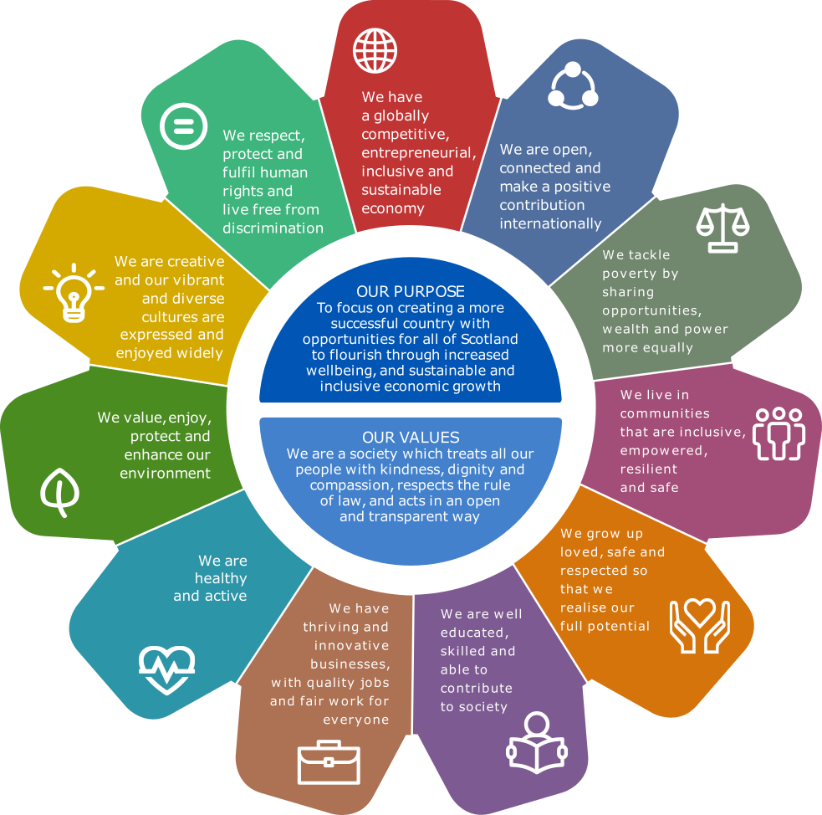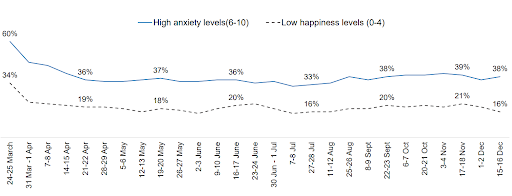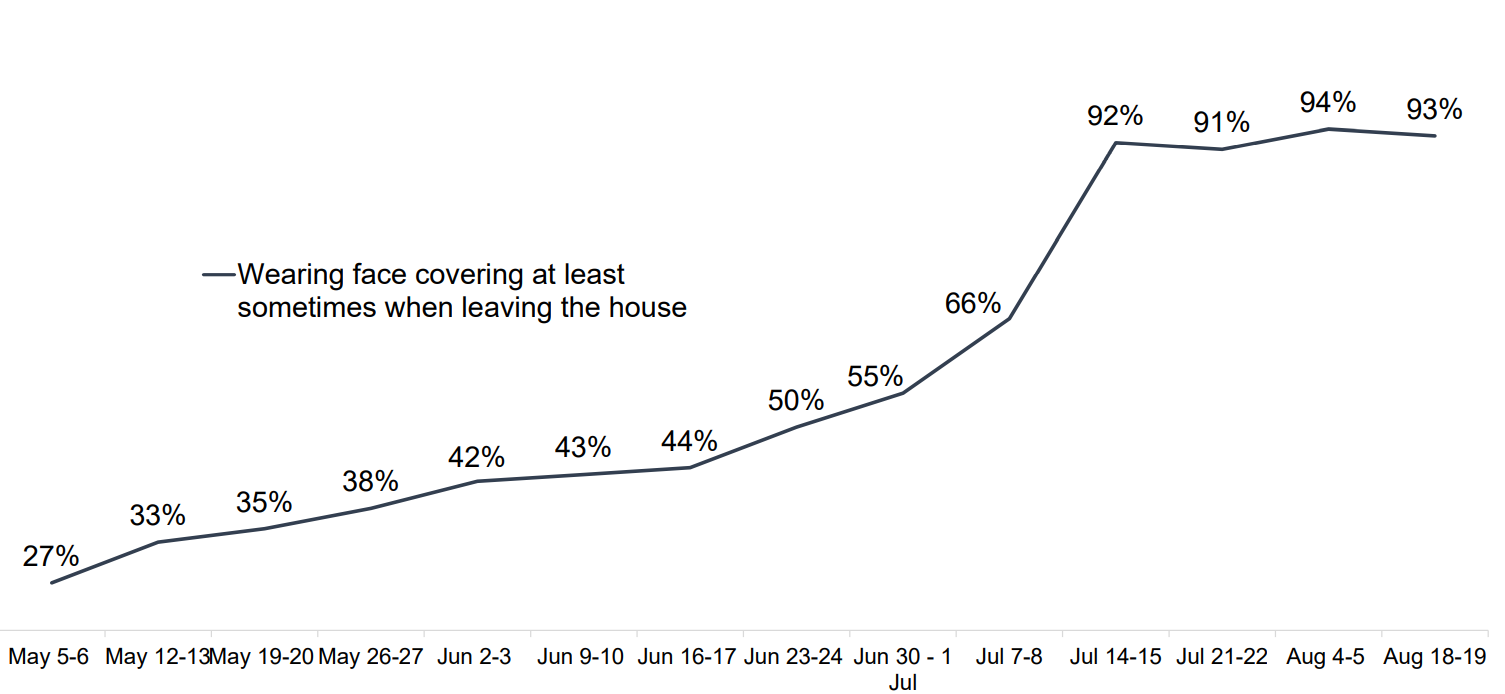Social research in the Scottish Government – pre-pandemic
The National Performance Framework illustrates the purpose and values of the Scottish Government and the national outcomes in its eleven colourful petals. With these outcomes in mind, around 150 social researchers work alongside operational researchers, statisticians and economists in order to inform, with updated evidence, the policy development cycle.

Researchers are involved in several phases of the policy cycle: studying best practices across the world, identifying emergent needs, studying sub-groups of the population, and providing analytical support, as well as being involved in the monitoring and evaluation of policies and services.
Research during the pandemic
In March 2020, the immediate response to the pandemic was to form a COVID-19 analytical hub led by the Scottish Government Chief Statistician and Chief Social Researcher to provide data and research on the short and long-term impact of COVID-19 in Scotland. The research was designed based on a model of four harms:
- Direct health harms, such as number of hospitalisations and deaths related to COVID-19.
- Non-COVID-19 health harms, such as number of deaths not related to COVID-19 and general wellbeing.
- Societal harms, e.g. isolation, safety, young people and inequalities.
- Economic harms, i.e. the impact of COVID-19 on the economy and behaviours.
The research on COVID-19 was based on two main research questions:
1. What is the impact of the pandemic on communities, households, people and which groups are more affected?
2. What enables people to follow the public health rules (e.g. social distancing, face masks etc.), and what places barriers?
There was an abundance of data used to study these questions which came from various sources:
There was an abundance of data used to study these questions which came from various sources:
- Administrative data – health, Police, transport, education, etc.
- Weekly online panel polling by Ipsos Mori and YouGov investigating topics such as how people are feeling, anxiety levels, isolations, vaccination, etc.
- Telephone surveys – 3 waves by Ipsos Mori.
- Public engagement via Citizenspace and consultation with stakeholders.
- Qualitative research including focus groups with community groups and interviews –useful to study the impact of COVID-19 on different groups of the population.
The biggest challenge, according to Ben, was the fast turnaround of the situation and data. There was also a lack of local data needed to have a clear picture of the 32 Local Authorities in Scotland and unequal impacts across society.
Examples of key findings
Subjective wellbeing: YouGov weekly polls conducted by the Scottish Government (unpublished) asked people how happy and how anxious they felt the day before, and if they felt worried about the Coronavirus situation. The poll revealed that people felt more anxious and less happy at the start of the pandemic. During the same period they were more worried about the Coronavirus situation. The poll also showed that the levels of optimism that things will ‘start to get better soon’ went up and down, with lows on optimism between September and mid-November 2020. #
Overall, how happy/anxious did you feel yesterday (on a scale of 0-10):

Source: YouGov (commissioned by the Scottish Government)
Sources of worry: A study conducted by Ipsos Mori showed that the main source of worry for people during 2020 was friends or family becoming seriously ill with Covid-19 (68% in December 2020), followed by friends’ or family’s mental health (48% in December 2020). Financial hardship was among the main worries (25% in December 2020), but nowhere near how worried people were about their friends and families.
Daily life: Based on the same study, in December 2020, compared to May 2020, household income was lower, especially for the self-employed and in deprived areas of Scotland. Work was different, with more remote work being implemented. In general and not surprisingly, people socialised more via phone calls, video calls and messaging, engaged more with the news and shopped more online.
Source: Ipsos Mori - Impact of COVID-19 on Wellbeing in Scotland: Wave 2
Social Capital: A study of social capital by the Scottish Government pre and during the pandemic revealed an expected increase in loneliness, but also a decrease in how safe people feel in their neighbourhood and how strongly they feel they belong to their immediate neighbourhood. Genders differed, with women feeling less safe and more lonely compared to men.

Source: Questions from different sources and survey modes
Pre-Covid: Scottish Household Survey 2019, April-August 2020 Ipsos Mori Scotland
August-present YouGov weekly polls
Covid-19 mitigation measures: Among the mitigation measures applied to reduce the risk of Covid-19 transmission was maintaining a physical distance when meeting others and wearing face coverings. Interestingly the following figure shows that people were compliant to the measure of wearing a face covering: when in July 2020 face coverings became mandatory in some settings, the percentage of people who reported to be wearing one increased to more than 90%.

Source: YouGov weekly Scotland survey. Base (n=1001-1036)
Future challenges for social research
Ben identified a few of the challenges for social research during the pandemic and in the future. Among these challenges are the fast and ongoing changes regarding the virus and its impact on society; and the impact of digital exclusion on people, but also on the quality of research. This was a topic much discussed in the Q&A that followed. Researchers and practitioners are worried about selection bias and about over-relying on self-reported data (recollection and response-bias problems).
Another challenge is around capturing data from different groups of the population with different experiences and diverse settings. Finally, decisions regarding policy changes need to be taken and implemented quickly, which makes the use of evidence in the policy cycle interesting and even more complicated.
Among research questions that we need to answer in the near future are why some groups are more resilient and how long-term the impacts of Covid-19 will be? Can we expect those impacts to lift at the same time as restrictions?
To access Ben’s presentation, click here.
For the latest updates on SRA events and lunchtime seminars, please visit the
SRA Events page. For more information on the work of the SRA Scotland branch, please visit the
SRA Scotland page.
Bio: Ben Cavanagh leads the social research programme on COVID-19 in the Scottish Government COVID-19 Modelling and Analysis Hub. He has worked as a Government Social Researcher since 2006, mainly in the areas of community safety, social capital, and societal wellbeing. Twitter @benj